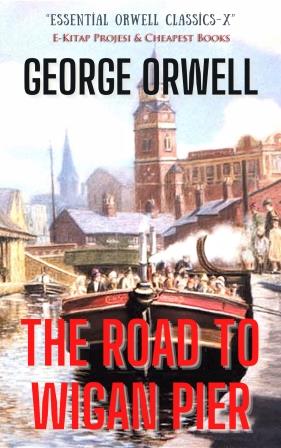
The Road to Wigan Pier
The Road to Wigan Pier is a book by the English writer George Orwell, first published in 1937.
More Search Results...

The Road to Wigan Pier is a book by the English writer George Orwell, first published in 1937.
PREFACE
"It is only when you meet someone of a different culture from yourself that you begin to realise what your own beliefs really are."
"We are living in a world in which nobody is free, in which hardly anybody is secure, in which it is almost impossible to be honest and to remain alive."
"Here you come upon the important fact that every revolutionary opinion draws part of its strength from a secret conviction that nothing can be changed."
― George Orwell, The Road to Wigan Pier
The Road to Wigan Pier is a book by the English writer George Orwell, first published in 1937. The first half of this work documents his sociological investigations of the bleak living conditions among the working class in Lancashire and Yorkshire in the industrial north of England before World War II. The second half is a long essay on his middle-class upbringing, and the development of his political conscience, questioning British attitudes towards socialism. Orwell states plainly that he himself is in favour of socialism, but feels it necessary to point out reasons why many people who would benefit from socialism, and should logically support it, are in practice likely to be strong opponents.
The book grapples "with the social and historical reality of Depression suffering in the north of England, – Orwell does not wish merely to enumerate evils and injustices, but to break through what he regards as middle-class oblivion, – Orwell's corrective to such falsity comes first by immersion of his own body – a supreme measure of truth for Orwell – directly into the experience of misery."
Book Summary:
Orwell submitted the typescript of Keep the Aspidistra Flying to Gollancz on 15 January 1936. At some point in the next few days Gollancz asked him to consider a new project – writing a book about unemployment and social conditions in economically depressed northern England. In the period from 31 January to 30 March 1936, Orwell lived in Wigan, Barnsley and Sheffield researching the book.
Gollancz was not only a successful publisher but also a dedicated social reformer. "As a social reformer, a socialist, and an idealist, Gollancz had an unquestioning, perhaps overly optimistic, faith in education; if only people could be made to know the nature of poverty, he thought, they would want to eradicate it, remove from power the government that tolerated it, and transform the economic system that brought it into being." As a successful publisher however, he knew that to reach a large audience he needed something more than a collection of facts, statistics, graphs and dogmatic conclusions.
The view that this was a specific commission with a £500 advance-two years' income for Orwell at the time-is based on a recollection by Geoffrey Gorer who was interviewed for Melvyn Bragg's TV programme Omnibus in 1970. He reported that Gollancz had offered Orwell £500 to underwrite the trip, and but for Gollancz's support Orwell would never have gone. Recent biographers, however, do not repeat this account.